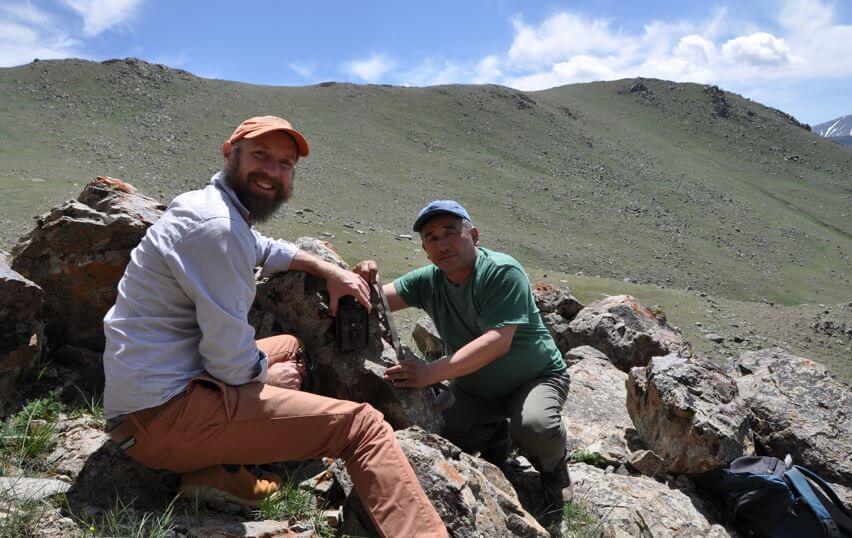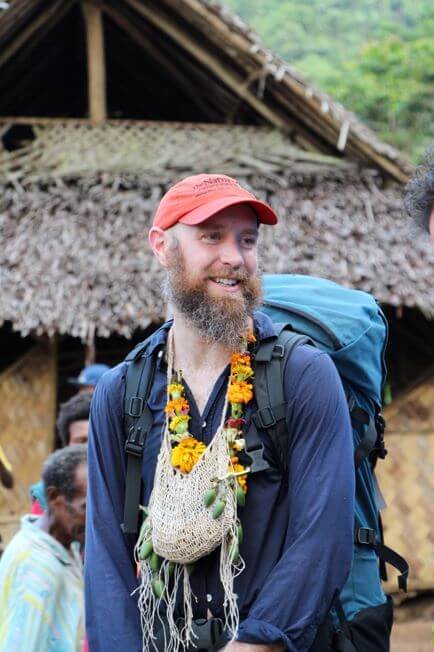
Landing your dream job: A success story from The Nature Conservancy’s Eddie Game
An introduction to conservation
Eddie Game was working for Australia’s fisheries department in the sub-Antarctic when he realized that he wanted to become a conservation scientist. Unlike many others who are drawn to the field after having experienced some form of environmental destruction, he was drawn to conservation after observing the success of protected areas.
“This region was so far removed from people and yet even down there the difference between protected and unprotected areas was staggering.” Inspired and ready to make a difference, he decided to undertake a PhD on catastrophes, resilience, and the theory of designing marine reserves at the University of Queensland, Australia. Now Eddie is the Lead Scientist of the Asia Pacific region for the world’s largest environmental conservation organization: The Nature Conservancy.

Eddie Game and colleague setting up camera traps for snow leopards in Mongolia. Photo © The Nature Conservancy.
Career advice
When asked what advice he would give to current students who aspire to be conservation scientists, Eddie emphasized the importance of building a diverse skillset, obtaining experience in communicating to a wide range of audiences and networking.
“At least as important as what you do is the network that you build. When selecting an advisor, I would focus a lot on what opportunities that person can offer you to interact with the community of interest.”

Eddie Game and Chris O’Bryan prepping PVC pipe for fieldwork in Martu Country, Australia.
Photo © Justine Hausheer.
To be competitive in the field, Eddie recommends pursuing a PhD as well as obtaining global experience to demonstrate an ability to work under a range of different circumstances. If you don’t have those experiences, he advises making a conscious effort to comprehend and be able to communicate what it would be like to work under various conditions.
If your goal is to work with a conservation non-governmental organization (NGO), Eddie recommends reaching out to your organization of interest and getting involved with them as soon as possible. “The sooner that you reach out the better. Don’t wait until the end of your education. Talk to people who work for the organization and get to know the organization.”

Setting up acoustic recorders in Papua New Guinea. Photo © Justine Hausheer.
Eddie was first introduced to The Nature Conservancy (TNC) while he was undertaking his PhD. After working with TNC on a plan for a marine protected area in Papua New Guinea, he knew he wanted to work for them, so he applied for a position with them after completing his PhD, but didn’t get the position.
Shortly after turning him down for the role, TNC contacted him regarding a different position that they felt he was well suited for. Even though it wasn’t the position that Eddie had initially applied for, he was open to the opportunity because he knew that this was the organization that he wanted to pursue a career with.
“If you are really keen on getting into an organization then you need to think broadly about what you are suited for, which might mean not applying for the dream job.”

Working with Indigenous rangers on Martu country in western Australia. Photo © Eddie Game.
It isn’t every day that you get turned down for one role and then asked to apply for another, so clearly there was something about Eddie that stood out to TNC. The position came down to Eddie and someone who had more experience and this time around Eddie was given his opportunity to work for his dream organization. The lesson that he learned from this experience: “Always throw your hat in the ring – even if you know that someone more qualified has applied.”
As it turned out, TNC chose Eddie because he had an open mind, was willing to devote all of his energy to TNC and would not come to the organization with any ‘career baggage.’ When asked what made him stand out he explained the importance of being able to apply the experiences that he had and his knowledge to best serve the organization.
“Conservation NGOs are always looking for people who can bring something new to the organization, so it is important that your skills and experiences complement the organization while adding something to it.”

Eddie Game in a Musiamunat village in Papua New Guinea. Photo © Justine Hausheer.
Life as a lead scientist for TNC
As far as a typical day as a lead scientist for TNC goes, Eddie explained that it starts with early morning phone calls and connecting with people from all over the world, followed by reviewing materials for funders/media/proposals/scientific reviews, helping scientists in the Asia Pacific region with specific tasks and then usually planning for some kind of field work.
The most challenging aspects of his job are jumping from project to project, which does not allow him to give every project 110%, as well as being away from his family. His fondest project was when he worked on grazing management in Northern Kenya with the Samburu people because he was involved in the project long enough to witness how it really did make a difference both to the people and wildlife in the region.

Eddie talking to a Samburu elder (or Mze) about grazing management in northern Kenya. Photo © The Nature Conservancy.
Success for Eddie is when changes are enacted as a result of the science that his team undertakes. “It gets addictive when you start to see changes on the ground as a direct result of the work that you do. It creates a real rush that makes you want more of it.”
For more information on Eddie Game or The Nature Conservancy please use the links bellows:
https://www.nature.org/science-in-action/our-scientists/eddie-game.xml

